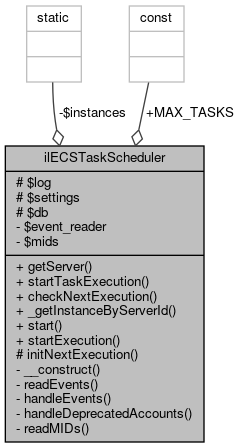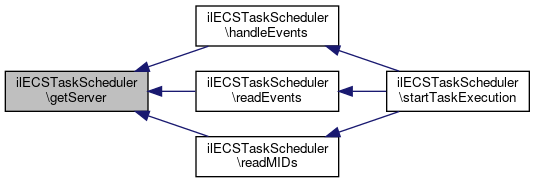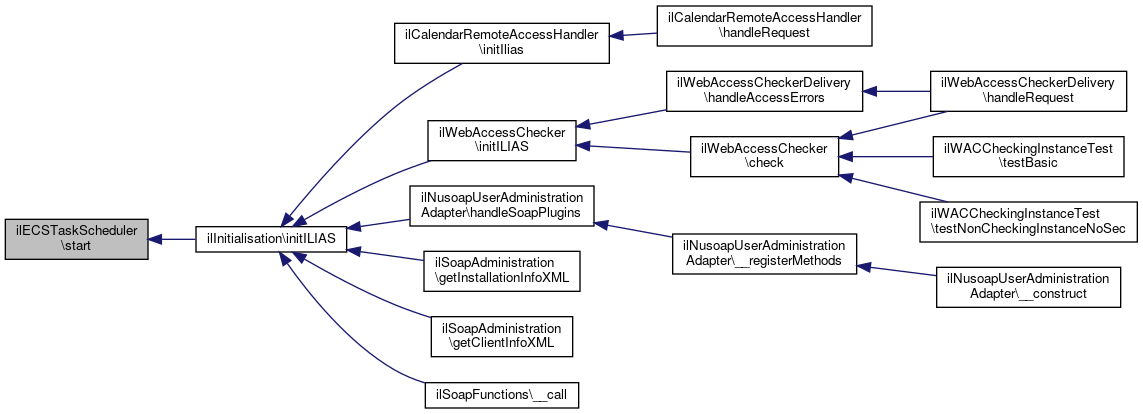 Collaboration diagram for ilECSTaskScheduler:
Collaboration diagram for ilECSTaskScheduler:Public Member Functions | |
| getServer () | |
| Get server setting. More... | |
| startTaskExecution () | |
| Start Tasks. More... | |
| checkNextExecution () | |
| Start. More... | |
Static Public Member Functions | |
| static | _getInstanceByServerId ($a_server_id) |
| get singleton instance Private access use ilECSTaskScheduler::start() or ilECSTaskScheduler::startTaskExecution More... | |
| static | start () |
| Start task scheduler for each server instance. More... | |
| static | startExecution () |
| Static version iterates over all active instances. More... | |
Data Fields | |
| const | MAX_TASKS = 30 |
Protected Member Functions | |
| initNextExecution () | |
| Call next task scheduler run. More... | |
Protected Attributes | |
| $log | |
| $settings = null | |
| $db | |
Private Member Functions | |
| __construct (ilECSSetting $setting) | |
| Singleton constructor. More... | |
| readEvents () | |
| Read EContent. More... | |
| handleEvents () | |
| Handle events. More... | |
| handleDeprecatedAccounts () | |
| Delete deprecate ECS accounts. More... | |
| readMIDs () | |
| Read MID's of this installation. More... | |
Private Attributes | |
| $event_reader = null | |
| $mids = array() | |
Static Private Attributes | |
| static | $instances = array() |
Detailed Description
- Version
- $Id$
Definition at line 32 of file class.ilECSTaskScheduler.php.
Constructor & Destructor Documentation
◆ __construct()
|
private |
Singleton constructor.
@access public
Definition at line 56 of file class.ilECSTaskScheduler.php.
References $GLOBALS, $ilDB, $ilLog, and settings().
 Here is the call graph for this function:
Here is the call graph for this function:Member Function Documentation
◆ _getInstanceByServerId()
|
static |
get singleton instance Private access use ilECSTaskScheduler::start() or ilECSTaskScheduler::startTaskExecution
@access private
- Returns
- ilECSTaskScheduler
Definition at line 80 of file class.ilECSTaskScheduler.php.
References ilECSSetting\getInstanceByServerId().
Referenced by ilSoapUtils\handleECSTasks(), and ilECSSettingsGUI\readAll().
 Here is the call graph for this function:
Here is the call graph for this function: Here is the caller graph for this function:
Here is the caller graph for this function:◆ checkNextExecution()
| ilECSTaskScheduler::checkNextExecution | ( | ) |
Start.
@access public
Definition at line 348 of file class.ilECSTaskScheduler.php.
References $ilDB, $query, and settings().
 Here is the call graph for this function:
Here is the call graph for this function:◆ getServer()
| ilECSTaskScheduler::getServer | ( | ) |
Get server setting.
- Returns
- ilECSSetting
Definition at line 129 of file class.ilECSTaskScheduler.php.
References $settings.
Referenced by handleEvents(), readEvents(), and readMIDs().
 Here is the caller graph for this function:
Here is the caller graph for this function:◆ handleDeprecatedAccounts()
|
private |
Delete deprecate ECS accounts.
@access private
Definition at line 296 of file class.ilECSTaskScheduler.php.
References $ilDB, $query, $res, $row, ilDBConstants\FETCHMODE_OBJECT, and ilObjectFactory\getInstanceByObjId().
Referenced by startTaskExecution().
 Here is the call graph for this function:
Here is the call graph for this function: Here is the caller graph for this function:
Here is the caller graph for this function:◆ handleEvents()
|
private |
Handle events.
@access private
Definition at line 181 of file class.ilECSTaskScheduler.php.
References $GLOBALS, $handler, $i, $res, ilECSEvent\CREATED, ilECSEvent\DESTROYED, ilRemoteObjectBase\getInstanceByEventType(), getServer(), MAX_TASKS, ilECSEvent\NEW_EXPORT, ilECSEventQueueReader\TYPE_CMS_COURSE_MEMBERS, ilECSEventQueueReader\TYPE_CMS_COURSES, ilECSEventQueueReader\TYPE_COURSE_URLS, ilECSEventQueueReader\TYPE_DIRECTORY_TREES, ilECSEventQueueReader\TYPE_ENROLMENT_STATUS, ilECSEventQueueReader\TYPE_REMOTE_CATEGORY, ilECSEventQueueReader\TYPE_REMOTE_COURSE, ilECSEventQueueReader\TYPE_REMOTE_FILE, ilECSEventQueueReader\TYPE_REMOTE_GLOSSARY, ilECSEventQueueReader\TYPE_REMOTE_GROUP, ilECSEventQueueReader\TYPE_REMOTE_LEARNING_MODULE, ilECSEventQueueReader\TYPE_REMOTE_TEST, ilECSEventQueueReader\TYPE_REMOTE_WIKI, and ilECSEvent\UPDATED.
Referenced by startTaskExecution().
 Here is the call graph for this function:
Here is the call graph for this function: Here is the caller graph for this function:
Here is the caller graph for this function:◆ initNextExecution()
|
protected |
Call next task scheduler run.
Definition at line 385 of file class.ilECSTaskScheduler.php.
References $_COOKIE, $client_id, $ilLog, $res, ilSession\_duplicate(), ilSoapFunctions\handleECSTasks(), and settings().
 Here is the call graph for this function:
Here is the call graph for this function:◆ readEvents()
|
private |
Read EContent.
@access private
Definition at line 164 of file class.ilECSTaskScheduler.php.
References getServer().
Referenced by startTaskExecution().
 Here is the call graph for this function:
Here is the call graph for this function: Here is the caller graph for this function:
Here is the caller graph for this function:◆ readMIDs()
|
private |
Read MID's of this installation.
@access private
Definition at line 322 of file class.ilECSTaskScheduler.php.
References $reader, ilECSCommunityReader\getInstanceByServerId(), and getServer().
Referenced by startTaskExecution().
 Here is the call graph for this function:
Here is the call graph for this function: Here is the caller graph for this function:
Here is the caller graph for this function:◆ start()
|
static |
Start task scheduler for each server instance.
Definition at line 95 of file class.ilECSTaskScheduler.php.
References $server, ilContext\CONTEXT_WEB, ilECSServerSettings\getInstance(), and ilContext\getType().
Referenced by ilInitialisation\initILIAS().
 Here is the call graph for this function:
Here is the call graph for this function: Here is the caller graph for this function:
Here is the caller graph for this function:◆ startExecution()
|
static |
Static version iterates over all active instances.
Definition at line 115 of file class.ilECSTaskScheduler.php.
References $server, and ilECSServerSettings\getInstance().
 Here is the call graph for this function:
Here is the call graph for this function:◆ startTaskExecution()
| ilECSTaskScheduler::startTaskExecution | ( | ) |
Start Tasks.
@access private
Definition at line 141 of file class.ilECSTaskScheduler.php.
References $ilLog, handleDeprecatedAccounts(), handleEvents(), readEvents(), and readMIDs().
 Here is the call graph for this function:
Here is the call graph for this function:Field Documentation
◆ $db
|
protected |
Definition at line 46 of file class.ilECSTaskScheduler.php.
◆ $event_reader
|
private |
Definition at line 43 of file class.ilECSTaskScheduler.php.
◆ $instances
|
staticprivate |
Definition at line 36 of file class.ilECSTaskScheduler.php.
◆ $log
|
protected |
Definition at line 41 of file class.ilECSTaskScheduler.php.
◆ $mids
|
private |
Definition at line 48 of file class.ilECSTaskScheduler.php.
◆ $settings
|
protected |
Definition at line 45 of file class.ilECSTaskScheduler.php.
Referenced by getServer().
◆ MAX_TASKS
| const ilECSTaskScheduler::MAX_TASKS = 30 |
Definition at line 34 of file class.ilECSTaskScheduler.php.
Referenced by handleEvents().
The documentation for this class was generated from the following file:
- Services/WebServices/ECS/classes/class.ilECSTaskScheduler.php



















